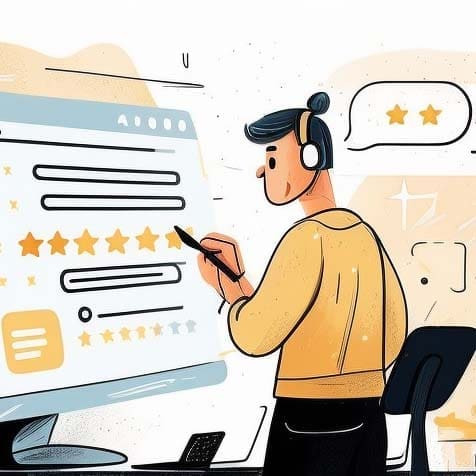Small Business, Big Impact: Local Digital Marketing Tips and Tricks
Importance of Local Digital Marketing for Small Businesses

Digital marketing is key for small businesses.
Digital Marketing for Small Businesses: Making a Local Impact
Digital marketing is key for small businesses. Local SEO strategies target customers at the city or neighborhood level. This boosts online presence and improves brand reputation. People are more likely to interact with a business that appears prominently on local search engine results pages. By utilizing effective digital marketing tactics, entrepreneurs can drive traffic to their websites and increase sales.
Hyperlocal Advertising: A Game-Changer
Small businesses can further increase their digital presence by focusing on hyperlocal advertising. This means targeting potential customers within a few miles of the business. Social media platforms like Facebook, Instagram, and Twitter can be used to reach out to people based on geography, interests, age group, and more. This strategy targets individuals most likely to purchase the products or services.
Investing in Video Creation
Video creation is very beneficial. Videos can explain new products or share customer testimonials. This helps with credibility and provides SEO “rich” content for social media platforms like YouTube. Tip: Use local influencers’ networks, such as geo-tagging and tagging your store/brand posts on social media. Providing them with incentives, like commissions, can create ‘Brand Ambassadors.’ You can help a small business reach Google’s first page, but customers must click.
Local Search Engine Optimization (SEO)
To improve your local small business’s digital marketing strategy, you need to focus on Local Search Engine Optimization (SEO) with sub-sections regarding the importance of Local SEO and how to optimize your website for Local SEO. Implementing these tips can help your business drive more traffic, improve online visibility, and increase customer engagement in your community.
Importance of Local SEO

Optimizing local SEO is essential for businesses to succeed in their target area.
Optimizing local SEO is essential for businesses to succeed in their target area. It boosts online presence and reliability and drives traffic to the site, resulting in higher sales & conversions.
Keywords & location-specific content should be used to appear at the top of search engine results pages. Create & verify listings on Google My Business, Yelp, etc., so customers can find information about your business. This builds trust & provides them with ratings & reviews before they make a decision.
Consistent contact info on various platforms is important to avoid confusion. Positive feedback from happy customers, like ratings and reviews, can upgrade your online reputation without a big cost or investing in traditional ad campaigns.
Google reports that 46% of searches have local queries. To stand out, optimize your website for local SEO.
How to Optimize Your Website for Local SEO
If you’re looking to entice local consumers, optimizing your website for local SEO is essential. Here are 4 easy steps to get you started:
- Claim your Google My Business Listing and make sure your name, address, and contact details are current.
- Create location-specific content on your site and include keywords that relate to your biz and locality.
- Present the same business info across all directories and review sites.
- Urge customers to leave online reviews.
| Action | Description |
|---|---|
| Claim your Google My Business Listing | Verify and update your business information, including name, address, and contact details on Google Maps. |
| Create location-specific content on your site. | Optimize your website with relevant keywords and location-based information to attract local customers. |
| Present consistent business info across all directories | Ensure your NAP (Name, Address, Phone Number) is accurate and consistent across all directories. |
| Encourage customers to leave online reviews. | Prompt satisfied customers to leave positive reviews on Google, Yelp, and other relevant review sites. |
Furthermore, bear in mind that how relevant and influential your website is also affected local search rankings. Keep your content fresh to keep site visitors interested.
As per Moz’s recent study, around 64% of all searches on Google have a local intent, suggesting the importance of local SEO for businesses nowadays.
Google My Business is like your mom’s address book but has your business info instead of phone numbers.
Google My Business
To optimize your small business with Google My Business, learn about the Importance of Google My Business and How to Optimize your Google My Business Page. The benefits are immense as it showcases your business information, photos, and reviews to the customers on Google Search and Maps. Understanding and utilizing Google My Business effectively can help your small business make a big impact.
Importance of Google My Business
 Google My Business is essential in boosting your online presence. Creating and managing a profile lets you give accurate info to potential clients, like operating hours, contact details, and reviews. This helps your business appear in local search results and maps, so more clients can find you.
Google My Business is essential in boosting your online presence. Creating and managing a profile lets you give accurate info to potential clients, like operating hours, contact details, and reviews. This helps your business appear in local search results and maps, so more clients can find you.
Having a Google My Business page helps you manage your reputation. You can respond to reviews and address any negative feedback. Plus, you get insights into how people use your profile, like how many people view or click on your website.
Signing up for a Google My Business profile is free and easy. Claim your business listing. Verify your account with a postcard or call. Fill in all the info, including quality images and videos. Post regularly.
A coffee shop owner in London had a huge increase in customers after they added accurate opening times and new menu items to their Google My Business page. People also left positive reviews despite not knowing the shop existed.
Optimize your Google My Business page and get ahead of the competition.
How to Optimize Your Google My Business Page
Optimizing your Google My Business page is key for your business to be easily found and attract customers. Follow these four steps to get started:
- Claim & verify your listing.
- Accurately provide business information, such as location & hours.
- Showcase your brand with photos & videos.
- Encourage customer reviews & respond quickly.
Remember to update your listing regularly with posts, events & promotions. Adding relevant keywords to your business description & category will help potential customers find you.
For example, despite great reviews on social media, an artisan bakery was having difficulty bringing in customers. With help from Google My Business experts, they posted daily specials & updated their business descriptions with details about their baked goods. This boosted their visibility & increased traffic & profitability.
Social media marketing can feel like a crowded pool of influencers. But the right strategy can help you make a splash!
Social Media Marketing
To effectively market your local business in today’s digital age, social media marketing is crucial. With the right strategy, you can use social media platforms like Facebook, Instagram, and Twitter to reach a wider audience and boost your brand awareness. In this section, we will explore the importance of social media marketing for local businesses and show you how to effectively use social media to market your business locally.
Importance of Social Media Marketing for Local Businesses
Social media is key for local businesses to advertise their brand and reach more people. Using helpful social media marketing tactics can help customer engagement, boost brand recognition, and in the end, bring in more revenue. Plus, with everyone having smartphones, digital marketing is more important than ever!
By utilizing keywords and hashtags on Instagram and Twitter, businesses can target potential customers based on what they like, where they live, and more. This assists them to get attention from people who may be interested in their products or services. Plus, social media metrics like clicks and engagements can give insight into customer behavior and interests.
Having an awesome social media presence can make a community around a business and also give customers a place to talk with the business. Posting updates about new products or offers is a simple way to draw in followers. By being active on social media with consistent branding, local businesses can become popular in their industry.
Not using these marketing channels can result in slow growth or worse – becoming obsolete. As social media plays a bigger role in life, companies not taking advantage are missing out on this incredible chance and could be left behind by competitors. Don’t miss out – get your business on the map with social media today!
How to Effectively Use Social Media to Market Your Business Locally
 Social media has become an essential tool for marketing a business locally. Here are six useful strategies:
Social media has become an essential tool for marketing a business locally. Here are six useful strategies:
- Understand the audience: Research their interests, needs & pain points. This will help you tailor your message & content. Quality content resonates with them & drives traffic to your website.
- Create & share quality content: Engage people on social media to build trust & a positive reputation.
- Engage customers: Monitor your results to determine what works best.
- Track & monitor results: Use location-based hashtags on Twitter & Instagram to make your content visible.
- Use location-based hashtags: Sponsored ads will reach a broader audience outside your followers.
- Sponsored posts
Go beyond the popular platforms like Facebook or Twitter. Create dynamic short videos for TikTok or Reels on Instagram. This will help increase engagement rates.
One coffee shop owner had success using Instagram contests. This increased sales and built customer relationships. This initiative created a buzz around their brand & increased traffic in-store.
To prevent online reputation problems, it’s better to stop them from happening than try and fix them later.
Online Reviews and Reputation Management
To improve your online reputation and attract more customers, dive into the world of online reviews and reputation management with “Online Reviews and Reputation Management” in “Small Business, Big Impact: Local Digital Marketing Tips and Tricks”. Discover the importance of online reviews and learn how to effectively manage and improve your online reputation through this section’s two sub-sections.
Importance of Online Reviews

The virtual world is a place where customers search for products and services. Reviews can help them decide what to buy and shape the company’s image. Positive reviews can support SEO and bring more traffic to the website. But negative reviews can discourage potential customers.
It’s important to stay active and manage your online presence. Encourage feedback, respond to criticism in a professional way, and thank satisfied customers. Doing all this helps create a positive brand image.
Pro Tip: Set up Google Alerts or similar tools to get email notifications as soon as a review appears. Quick responses show that you care about customer feedback and make a good impression. Remember – your online reputation is like a tattoo – think twice before you get one, and take care of it every day.
How to Manage and Improve Your Online Reputation
Having a positive online presence is key. Manage and boost your reputation by monitoring reviews and feedback across platforms. Address negative comments quickly and professionally. Highlight positives to impress. Additionally, regularly publish content to boost credibility and engagement. Be transparent and avoid false claims or exaggerated statements about yourself/brand. Engage with customers through social media and respond to inquiries promptly.
It’s vital to stay on top of your online reputation – potential customers could be influenced by negative reviews or false info. Take control of your digital image now to ensure a successful future.
Plus, support local businesses – who else will you complain about in online reviews?
Local Advertising
To effectively advertise your small business locally, you need to understand the importance of local advertising and how to do it right. In this section of the article on “Small Business, Big Impact: Local Digital Marketing Tips and Tricks,” we will explore the sub-sections: the significance of local advertising and effective ways to advertise your business to attract local customers.
Importance of Local Advertising
For small businesses, local advertising is essential for success! Target potential customers in your area with location-based ads. These ads guarantee personalized experiences, leading to higher click-through rates, engagement, and more sales.
Optimize your Google My Business listing to improve search rankings and website traffic. Stay up-to-date with industry trends. Invest in geofencing technology for real-time insights on customers. Timely push notifications make your presence visible in the community.
Let the local newspaper do the talking – it’s the best way to reach the right people.
How to Effectively Advertise Your Business Locally
Maximize local advertising for your business and get more customers. Here’s how:
- Utilize Google My Business,
- Be active on social media,
- Attend local events,
- Offer deals/promos,
- Use targeted ads with specific demographics.
To go further, try SEO optimization with location-based keywords.
Think about which local platforms work best. Print ads? Referral marketing? Know where your target audience is before investing too much.
Local advertising’s been around since the 19th century. Posters and billboards were used then. Now, websites and sponsored listings have evolved and offer targeted messaging. The goal is still the same: connect better with people who could be customers.
Small businesses, rejoice! Local digital advertising is like David against Goliath’s ad campaigns.
Conclusion: The Power of Local Digital Marketing for Small Businesses.
The potential of local digital marketing for small biz is huge! It gives them the chance to connect with local customers and stand out in a crowded digital world. Optimizing their online presence, listing biz on relevant directories, creating engaging social media content, and targeted ads can give small businesses an edge.
Collaborating with other local biz is a great way to raise brand awareness. Co-host events, joint promotions, and discounts; gain visibility and build relationships.
Reviews and feedback are key for reputation management. Respond to both good and bad reviews to show accountability and make customers happy.
Local digital marketing can have a real-world impact. Helping small biz grow creates job opps and economic growth all over the country.
A family-owned bakery in Seattle used local digital marketing and doubled its revenue in six months! They posted mouth-watering photos and attracted locals and tourists.
Frequently Asked Questions
1. Why is digital marketing important for small businesses?
Digital marketing is important for small businesses because it allows them to reach a wider audience through online channels such as social media, email marketing, and search engine optimization. It can also be a cost-effective way to promote your business.
2. How can I improve my website’s search engine ranking?
You can improve your website’s search engine ranking by optimizing your content with relevant keywords, building backlinks from other trustworthy websites, and regularly updating your website with fresh content.
3. What social media platforms should I focus on for my small business?
The social media platforms you should focus on for your small business depend on your target audience. For example, if you’re targeting younger consumers, platforms such as Instagram and Snapchat may be most effective. If you’re targeting professionals, LinkedIn may be a better option.
4. How often should I post on social media?
You should aim to post on social media at least once a day, but it’s important to find a frequency that works for your business and your audience. Regularly posting high-quality content will help keep your audience engaged and interested in your brand.
5. What types of content should I create for my digital marketing efforts?
You should create a variety of content types for your digital marketing efforts, including blog posts, social media images and videos, email newsletters, and infographics. The goal is to provide valuable content that engages your audience and establishes your business as an authority in your industry.
6. How can I measure the success of my digital marketing efforts?
You can measure the success of your digital marketing efforts by tracking metrics such as website traffic, email open and click-through rates, social media engagement, and conversion rates. By regularly analyzing these metrics, you can adjust your strategies and tactics to improve your results over time.

